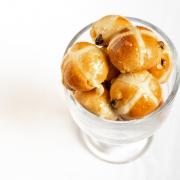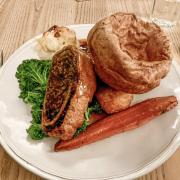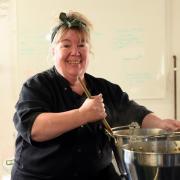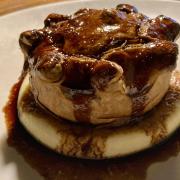It might seem strange to be reading about beer when our pubs have temporarily closed down. But we thought we’d give you something to look forward to for when things return to normal. So, enjoy a day in the life of a Cask Marque assessor; someone who tastes beer for a living...

Going round pubs tasting beer for a living has to be the best job in Norfolk. Getting paid to sample beer in the county renowned for its amazing breweries and fabulous pubs really is ‘living the dream’. That was my thought when I set out to follow in the footsteps of a Cask Marque beer inspector.
Cask Marque is an organisation that measures the quality of beer in pubs. That’s especially important with cask, or ‘real’ ale, because it’s a fresh, live product. The organisation employs independent assessors – well-qualified beer experts – to visit pubs and test their beers.
There are around 10,000 Cask Marque-accredited outlets in the UK. Most are pubs, but there are also clubs, hotels, bars, and holiday parks. Just search the CaskFinder App interactive map to see where you can find a good quality pint.
In Norfolk alone, there are 126 Cask Marqued venues. In all of them, you will find licensees who take great pride in selling excellent beer.
Our plan was to audit three already accredited pubs – to see if they were still good enough to retain their Cask Marque status. I was really keen to see the assessment process. And if they absolutely insisted, to try the beer myself...
But before going into more detail about my day, the assessment process and the CaskFinder App, let’s look at what’s so special about cask ale.
What is cask ale?
Cask ale is a fresh, natural drink made from four wholesome ingredients - water, malted barley, hops and yeast. Unlike most other beers, it has no added gas. It is unpasteurised and contains live yeast.
It’s not finished when it’s delivered to the pub. It needs to mature or ‘condition’ in the pub cellar. This is where some of the delicious flavours of the ale are developed. Because it is a fresh product, it has a short shelf life and should be sold within three days of being putting ‘on’.

You can identify a cask beer through the large ‘hand-pump’ or ‘hand-pull’ on the bar – or at events it is often served straight from the barrel-shaped container.
Why is cask ale unique?
Cask is the only beer with carbon dioxide that is naturally produced. It cannot be bought in a shop because it is matured in the pub cellar, where it is stored and conditioned in a cask - with careful management by the licensee!
What’s the difference between cask and keg beer?
Keg beers - which include mainstream lagers, stouts and some bitters - are usually pasteurised and sterile filtered. Because they have no live yeast needing to settle, they are ready to be served as soon as they are delivered to pubs – and they have a longer shelf life. Cask ale is fermented twice: once at the brewery and once in the cellar of the pub. It needs time to mature and settle and is not ready to serve straightaway. It has a shorter shelf-life because it is a fresh product.
Cask ale does not have as much fizz, or the same level of smooth foam, as keg beers as it doesn’t include any added gas. A light sparkle of carbon dioxide is produced naturally during conditioning – and this provides the tingle at the tongue that characterises real ale.
What do pubs need to do to look after cask beer?
Lots. The pubs which sell the best cask ale have someone who knows and cares about it and is prepared to follow the rules. The temperature of the cellar where the cask is stored is critical. If it’s too cold, the beer will be slow to condition and could become cloudy. If it’s too warm, it’ll be too fast to condition and will smell and taste rank! Anyway, who wants to be served a warm beer? Cellars should be set to a cool 11 to 13 degrees and the doors should be kept closed to prevent warm air from entering. No ifs, no buts!

Cask ale should always be ‘put to bed’. The process works very similarly to when you open up a bottle of coke: to preserve the quality of the taste, you screw the lid back on as tightly as possible. Makes sense to me.
Beer lines should be cleaned every seven days – and the cask should be stored in a clean, organised environment.
What temperature should good quality ale be stored and served at?
A cool but not chilled 11C to 13C. Temperature is controlled and maintained using what’s known as an ‘ale python’, which must be switched on and topped up with water regularly.
By contrast, lagers are generally served between 2C and 8C, although some are deliberately served extra cold at 0C.
And what should cask beer look, taste and smell like?
Obviously, with over 10,000 different cask beers on offer each year, there is a lot of variation. The aroma and taste should always be appetising, fresh and non-tainted. Well-conditioned ale should normally appear sparkling bright and completely clear. There are exceptions however as some cask beers are brewed in a style that is naturally cloudy.

How do Cask Marque assessors test for quality?
To pass and gain retain their Cask Marque status, pubs must score at least 16 out of 20 from the Cask Marque assessors’ visit. There are five potential marks each for appearance, aroma, taste, and temperature.
Inspectors test the temperature using a special beer thermometer, and appearance by holding the beer up to the light to check clarity (hazy beers fail unless the brewer has specified that the beer has been brewed specifically to be cloudy)
Aroma is tested by covering the glass, swilling the beer around and then inhaling the aromas (the experts know the ‘off’ aromas instantly – and can put names to a myriad of different positive scents. Wow.)
Taste by testing the beer: again, the inspectors can identify ‘off’ flavours and any hint of bitter, sweet, fruit, spice, herbal, floral or other flavour notes. They also look out for the ‘condition’ (slight sparkle), ‘mouthfeel’ and ‘finish’ of the beer. A sip of a good beer should tingle the taste buds and entice drinker to go back for another…and another…
The Waterbreak Test looks for glass condition: it should be clean, cold, and dry. Glasses should always be washed separately from dishes and cups.
And that’s how a Cask Marque audit works. In that order. When the licensee has looked after the beer, the reward for the assessor is a taste of one of the most satisfying drinks in the world – and the knowledge that customers to that pub can be assured of great quality beer.

Can pubs fail?
Yes. If there’s a failure, guidance is given on site to help the pub improve its practice and succeed next time around. Assessors will often give pubs a couple of weeks to get things right before going back and repeating the assessment.
The most common cause of failure is that beers have been on sale for too long. Once a cask is ‘put on’, it should be sold within three days. After this, it could start to develop unwanted aromas and tastes – and put people off choosing cask next time.
My assessment
Audits are not pre-organised – and assessors can just turn up out of the blue. But licensees and pubs know the rules. They should be serving their beer perfectly all the time: not just for the inspectors’ visit! I’m pleased to say however that all three pubs visited passed with flying colours; phew!
The fact is, we didn’t just booze our way through. In fact, I’d say we didn’t even consume three quarters of a pint over the course of the day. But it was fantastic to visit pubs, meet licensees, and learn just what an art there is to keeping good beer – and what skills are required to judge it.
Many of the Cask Marque assessors are highly qualified brewers and are all technical beer experts. I may not be that, but I might have to start taking my thermometer to the pub from now on…
Let’s hope that once things get back to a better state we see pubs full of customers keen to try, drink and celebrate cask ale. It’s very important to support each other through this challenging time – and that includes craft brewers and pubs, which are at the heart of local communities.
What is the CaskFinder App?
The popular CaskFinder App is free to download and easy-to-use. Even if you’re sitting at home, why not download the app to check out the tasting notes of 10,000 different beers (bottled as well as cask)? Do rate the ones you know or the new ones you try.
Check out the Cask Marque accredited pubs so that once the country is up and running again you can plan your visits. You can even win prizes through the ‘World’s Biggest Ale Trail’ which you are automatically signed up to once you register for the app.
Each pub has a unique QR code on a certificate, which should be displayed in an easily visible and accessible place. You scan this to register your pub visit. As your pub tally increases, prizes such as bottle openers, t-shirts, branded pint glasses, fleeces, personalised certificates, pens, hats, drink coasters can be won!
And there are some fantastic Cask Marque accredited pubs in Norfolk. From the cultural, historic, city pubs of Norwich to the beautiful North Norfolk coastline public houses, the county is blessed with absolute gems. Something to look forward to.
To download the CaskFinder App, visit: https://cask-marque.co.uk/cask-finder/



























